A) less education would be acquired, since society has not considered the positive external benefits of education.
B) more education would be acquired, since society has not considered the positive external benefits of education.
C) the optimal amount of education would be acquired by community members, since they each paid for the amount of education they wanted.
D) a Pigouvian tax would ensure the optimal amount of education.
Correct Answer

verified
Correct Answer
verified
Multiple Choice
The marginal benefit received from pollution is less than its marginal cost in the market for highly polished glass.In this situation:
A) firms in the market produce the socially optimal level of pollution.
B) society's well-being cannot be improved by changing the quantity of pollution.
C) firms in the market produce too much pollution.
D) firms in the market produce too little pollution.
Correct Answer

verified
Correct Answer
verified
Multiple Choice
Positive externalities are:
A) similar to negative externalities in their ease of measuring marginal benefits.
B) likely to be solved with the use of a Pigouvian tax.
C) difficult to measure, since marginal benefits are hard to observe.
D) result from greater than optimal production of a good.
Correct Answer

verified
Correct Answer
verified
True/False
Externalities exist when individuals impose costs or confer benefits on others but don't have an incentive to take those costs or benefits into account.False
Correct Answer

verified
Correct Answer
verified
Multiple Choice
Figure: MSB and MSC of Pollution 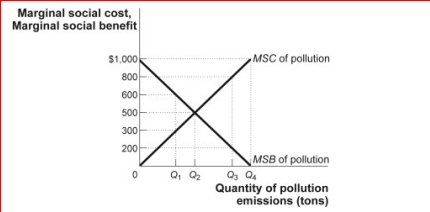
 (Figure: MSB and MSC of Pollution) The figure MSB and MSC of Pollution shows the marginal social cost and marginal social benefit of pollution.What level of pollution would be emitted in a market economy without government regulation?
(Figure: MSB and MSC of Pollution) The figure MSB and MSC of Pollution shows the marginal social cost and marginal social benefit of pollution.What level of pollution would be emitted in a market economy without government regulation?
A) Q₁
B) Q₂
C) Q₃
D) Q4
Correct Answer

verified
Correct Answer
verified
Multiple Choice
Figure: Pollution and Efficiency 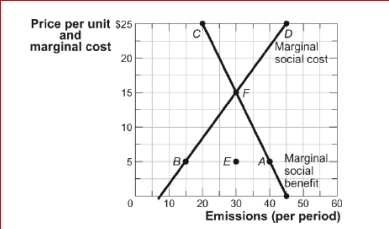
 (Figure: Pollution and Efficiency) Look at the figure Pollution and Efficiency.In this market, where sulfur emission is a result of production, an efficient solution is one in which:
(Figure: Pollution and Efficiency) Look at the figure Pollution and Efficiency.In this market, where sulfur emission is a result of production, an efficient solution is one in which:
A) MSB < MSC.
B) MSC < MSB.
C) total cost = total benefit.
D) MSC = MSB.
Correct Answer

verified
Correct Answer
verified
Multiple Choice
Suppose the production of roses generates a positive externality in that travelers enjoy the scenic rural vistas.Then the market price of roses:
A) is less than the marginal social benefit of roses.
B) is more than the marginal social benefit of roses.
C) equals the marginal social benefit of roses.
D) may be more than, less than, or equal to the marginal social benefit of roses.
Correct Answer

verified
Correct Answer
verified
Multiple Choice
Figure: MSB and MSC of Pollution 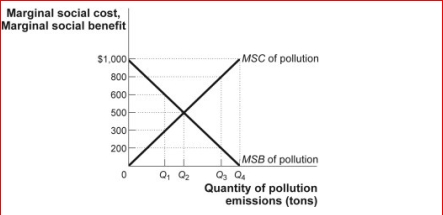
 (Figure: MSB and MSC of Pollution) The figure MSB and MSC of Pollution shows the marginal social cost and marginal social benefit of pollution.What level of pollution represents the socially optimal level?
(Figure: MSB and MSC of Pollution) The figure MSB and MSC of Pollution shows the marginal social cost and marginal social benefit of pollution.What level of pollution represents the socially optimal level?
A) Q₁
B) Q₂
C) Q₃
D) Q4
Correct Answer

verified
Correct Answer
verified
Multiple Choice
Suppose the production of DVDs generates sulfur dioxide, an air pollutant.Then the market price for DVDs:
A) is less than the marginal cost to society of producing DVDs.
B) is more than the marginal cost to society of producing DVDs.
C) equals the marginal cost to society of producing DVDs.
D) may be more than, less than, or equal to the marginal cost to society of producing DVDs.
Correct Answer

verified
Correct Answer
verified
Multiple Choice
If government officials set an emissions tax too low:
A) there will be too little pollution.
B) there will be too much pollution.
C) the marginal social cost of pollution will be less than the marginal social benefit of pollution.
D) there could be either too much or too little pollution.
Correct Answer

verified
Correct Answer
verified
Multiple Choice
If the number of available tradable emissions permits is decreased, the equilibrium price of the permits and the equilibrium quantity of emissions _.
A) decreases; decreases
B) increases; increases
C) increases; decreases
D) decreases; increases
Correct Answer

verified
Correct Answer
verified
Multiple Choice
Suppose government officials have set an emissions tax to reduce pollution.Further suppose that with the emissions tax, the marginal social cost of pollution exceeds the marginal social benefit of pollution.The emissions tax is:
A) too low.
B) too high.
C) optimal.
D) efficient.
Correct Answer

verified
Correct Answer
verified
Multiple Choice
Figure: Efficiency and Pollution 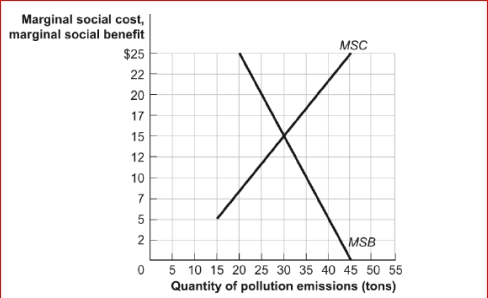
 (Figure: Efficiency and Pollution) Look at the figure Efficiency and Pollution.If the government imposed an environmental standard that did not allow the quantity of pollution to exceed 40 tons, there would be:
(Figure: Efficiency and Pollution) Look at the figure Efficiency and Pollution.If the government imposed an environmental standard that did not allow the quantity of pollution to exceed 40 tons, there would be:
A) a socially optimal quantity of pollution.
B) too little pollution, because the marginal social benefit of pollution would exceed the marginal social cost of pollution.
C) too much pollution, because the marginal social cost of pollution would exceed the marginal social benefit of pollution.
D) too much pollution, because any pollution is too much from an economist's perspective.
Correct Answer

verified
Correct Answer
verified
Multiple Choice
(Table: Externalities from Parks) The table Externalities from Parks shows the marginal social benefit and the marginal social cost of preserving various amounts of land in a city for a public park.Without government intervention, the amount of land dedicated to the public park will be acres.
A) 0
B) 1
C) 3
D) 9
Correct Answer

verified
Correct Answer
verified
True/False
Since talking while driving generates a negative externality, banning talking while driving would be economically efficient.True
Correct Answer

verified
Correct Answer
verified
Multiple Choice
Figure: Negative Externalities and Raising Pigs for Pork 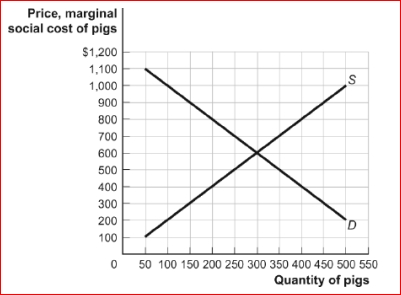
 (Figure: Negative Externalities and Raising Pigs for Pork) Refer to the figure Negative Externalities and Raising Pigs for Pork.If the marginal external cost of raising a pig for pork is $200, then the socially optimal quantity of pigs to raise is and
The socially optimal price is _.
(Figure: Negative Externalities and Raising Pigs for Pork) Refer to the figure Negative Externalities and Raising Pigs for Pork.If the marginal external cost of raising a pig for pork is $200, then the socially optimal quantity of pigs to raise is and
The socially optimal price is _.
A) 150; $900
B) 200; $800
C) 250; $700
D) 300; $800
Correct Answer

verified
Correct Answer
verified
Multiple Choice
A familiar example of a negative externality is loud music on a college campus.In principle, it should be possible to internalize this externality by permitting students to negotiate about rights to play music during particular time periods.The most likely reason that this does not happen is that:
A) most students are unfamiliar with the Coase theorem.
B) the transaction costs associated with identifying and establishing communication with students would be high.
C) agreements arising from such negotiations could not be enforced.
D) most students don't view loud music as a negative externality.
Correct Answer

verified
Correct Answer
verified
Multiple Choice
Figure: Efficiency and Pollution 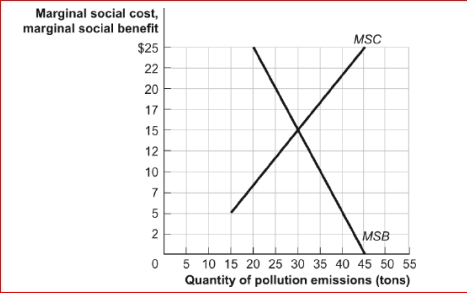
 (Figure: Efficiency and Pollution) Look at the figure Efficiency and Pollution.A Pigouvian tax of $10 will result in a quantity of pollution for which the:
(Figure: Efficiency and Pollution) Look at the figure Efficiency and Pollution.A Pigouvian tax of $10 will result in a quantity of pollution for which the:
A) marginal social benefit is less than the marginal social cost.
B) marginal social benefit exceeds the marginal social cost.
C) marginal social benefit equals the marginal social cost.
D) resources are allocated efficiently.
Correct Answer

verified
Correct Answer
verified
Multiple Choice
Figure: Model of a Competitive Market (Figure: Model of a Competitive Market) Given the figure Model of a Competitive Market, if there are external costs, a tax imposed on sellers will:
A) decrease the equilibrium quantity.
B) increase the equilibrium quantity.
C) have no effect on the equilibrium price.
D) decrease the equilibrium price.
Correct Answer

verified
Correct Answer
verified
Multiple Choice
The proposition that if bargaining is costless, then the market can achieve an efficient outcome is the:
A) Coase theorem.
B) property rights paradigm.
C) market rights theorem.
D) efficient environment paradigm.
Correct Answer

verified
Correct Answer
verified
Showing 101 - 120 of 234
Related Exams